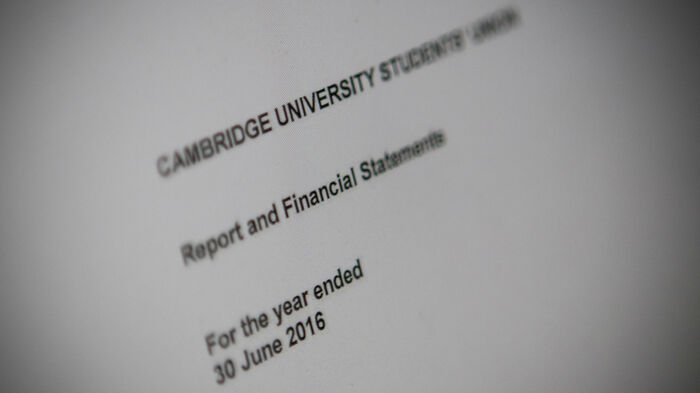Daisy Eyre says CUSU will cut activities, not staffing, if financial situation remains unstable
In an open presentation aimed at common room and liberation campaign representatives, the CUSU president also sounded caution over the potential success of a new careers publication

Daisy Eyre, president of CUSU, said that the student union may have to consider restructuring its staffing and played down the suggestion that a new careers publication may turn around its ailing finances, during a presentation to students on Monday night.
Discussing potential ways for CUSU to save money, Eyre raised the possibility, first suggested last term, that its staffing arrangements could change. However, she said this would consist of changing current staff duties and leaving vacant roles empty, rather than firing staff. She also turned off a student video broadcast following questions about the organisation’s management.
Asked how far CUSU would go to reduce anticipated losses, Eyre said “we are happy to cut where it’s necessary”, adding “we haven’t got a choice”. She said the student union will seek to consult students about where cuts can be made, following the University’s central funding allocation round in December, and that it was anticipating a continued shortfall regardless of the outcome.
“Cutting sounds really bad, we would look at it as restructuring,” Eyre continued unprompted. She then clarified that remark, saying “nobody’s job would be lost”. She suggested that CUSU would instead look into changing the responsibilities of its current staff: “We would thinking about which of our activities students value the most. We wouldn’t cut in terms of people, we would cut in terms of activities”.
Staffing costs currently make up the majority of the student union’s expenditure. It has around 20 full- or part-time positions for staff and officers, with around a third of those sharing some duties with the Graduate Union, according to a document circulated last year. Eyre said that CUSU is currently carrying two vacancies among its staff roles: membership coordinator and finance manager.

In briefing materials circulated in Easter Term ahead of presenting its 2017–18 budget, which anticipated a £75,000 deficit, CUSU said that it “will not meet a break-even budget in the medium- to longer-term without deeper reductions in expenditure, which will likely result in reductions to the staff and/or officer team.”
Eyre said that if the student union’s financial situation does not improve, changing existing staff arrangements would be on the table as a cost-cutting option. “If we have to restructuring, that is what we’ll have to do,” she said. She said that this would probably take the form of choosing to leave the finance and membership coordinator positions vacant, and then changing the roles of remaining staff.
The student union is currently in the midst of substantial financial difficulties, brought about by the collapse over several years of two major funding sources: running club nights and co-producing a careers publication. In Easter, CUSU revealed losses to its financial reserves running in hundreds of thousands of pounds, and raised significant doubts over its ability to make a profit again in the short term. CUSU has stated it will be seeking a bailout during the University’s as part of its annual bid for resources for the central University.
The student union has already substantially cut elements of its operations, including slashing the money assigned to student union newspaper The Cambridge Student, liberation campaigns and sabbatical officers’ personal allowances. It is now having to consider deeper cuts.
Eyre’s comments came as part of a talk, ‘CUSU Finances Explained’, held by CUSU at the students’ unions’ lounge at 17 Mill Lane on Monday night to “make sure [students] understand our finances”. Many of the attendees were representatives from JCRs or liberation campaigns.
In a presentation, Eyre highlighted the student union’s claimed efficiency in gathering advertising revenue, saying CUSU makes £1.74 in ad revenue for every pound spent on staffing, compared to £0.29 at the average student union.
She positioned the upcoming ‘planning round’ as a crucial stage in CUSU’s negotiation with the University over its finances. The planning round is an annual process in which Cambridge’s central administration can “monitor progress towards strategic objectives and review the resources required to deliver them”. In it, University institutions have to submit detailed applications for funding, which are then assessed in terms of their importance. Eyre said that a request for a cash bailout to temporarily shore up CUSU’s finances would be part of its application this year, for which the deadline is December 1st. CUSU previously received a bailout in 2015.
Two years ago, CUSU had a planning round application which requested funds to refurbish its office rejected, after the proposal was deemed unnecessary and underdeveloped.
Eyre told attendees CUSU “need student support behind us” going into the planning round, but said she anticipated difficulties will continue, and that student members will have to think about which areas of the student union’s operations “they value the most”.
Tom Ashford, CUSU LGBT+ campaign chairman, suggested CUSU could save money by self-hosting its website. It currently pays around £8,000 a year for usage of the National Union of Students’ (NUS) Union Cloud platform. Referring to the NUS’s web platform, Eyre said CUSU had chosen to renew usage for an additional year, but added “I’m not sure we’ll continue to work with them”.
Eyre refrained from harsh criticism of St James’s House (SJH), the publisher that was previously CUSU’s business partner in producing the careers guides that were a key revenue source. In an interview with Varsity last month, Eyre said of SJH “They’re totally alienated from how students at Cambridge see themselves and how CUSU wants to see ourselves so I’m really glad we’re moving away from it”. CUSU has been attempting to move away from working with SJH, partially as a result of deciding that the publications produced from the partnership were not serving students adequately.
CUSU suggested last term that it may be able to develop a new careers publication to raise funds. Eyre confirmed that project was proceeding, but said it “probably won’t make as much money as the St James’s House publication”.
There has also been the suggestion that there were operational difficulties in CUSU’s partnership with SJH: when previous president Amatey Doku first discussed CUSU’s financial difficulties with CUSU Council, he alleged that they had emerged in part as the result of contract ‘slippage’, in which SJH was late to deliver on annual publications.
Doku later revised that story, saying that no more publications would be forthcoming. An email leaked to Varsity in the aftermath of revelations about losses showed that CUSU was contradicting itself about SJH’s role. In the email, CUSU’s general manager told staff that “publication dates had slipped”, in line with Doku’s original description of the situation.
Eyre’s views on SJH were more muted on Monday. Initially, while discussing the publisher Eyre she said she “May have to save this until after the presentation”, but added the partnership is “not appropriate for [CUSU], it doesn’t work anymore”.
She returned to the topic later in the talk, turning off a live Cambridge University Television (CUTV) broadcast that was taking place to address a question. As she was asked by Varsity whether CUSU would seek to review its management procedures based on the decision to end the business relationship with SJH which was proving income crucial to the student union running an operational profit, Eyre moved to turn off the video camera.
On the video stream, Eyre can be heard asking the student operating the livestream “Can I turn it off?”. He asks “Why?”, to which Eyre responds “Just because these questions are talking about specific things, and I don’t want it to be— [video cuts off].”
After the video was turned off, Eyre commented on the business relationship with SJH, saying “That money was becoming incredibly unreliable”, apparently reinforcing the initial narrative about ‘slippage’ that CUSU later publicly abandoned.
St James’s House has repeatedly declined to comment when contacted by Varsity in the past
 News / Cambridge academics stand out in King’s 2026 Honours List2 January 2026
News / Cambridge academics stand out in King’s 2026 Honours List2 January 2026 Interviews / You don’t need to peak at Cambridge, says Robin Harding31 December 2025
Interviews / You don’t need to peak at Cambridge, says Robin Harding31 December 2025 Comment / What happened to men at Cambridge?31 December 2025
Comment / What happened to men at Cambridge?31 December 2025 Features / “It’s a momentary expression of rage”: reforming democracy from Cambridge4 January 2026
Features / “It’s a momentary expression of rage”: reforming democracy from Cambridge4 January 2026 News / Varsity’s biggest stories of 202531 December 2025
News / Varsity’s biggest stories of 202531 December 2025












